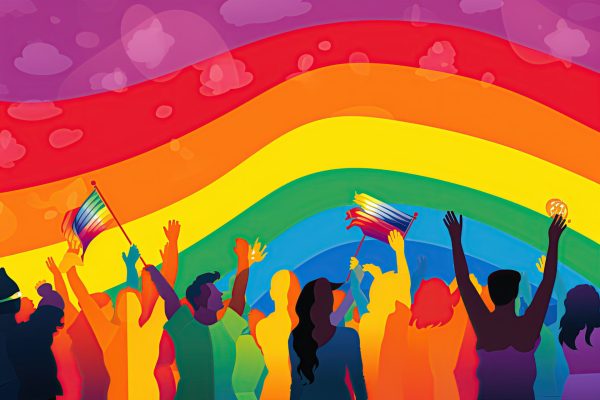Calling for an end to catcalling culture
A video featuring a woman being catcalled at over 100 times in one day of walking around New York made its rounds on the internet a few weeks back. Many jumped to either criticize or defend it, but what struck me the most was the women who were inspired to share their own experiences of street harassment. Many women, regardless of age, nationality, sexual orientation, profession, etc., had a story to tell about a time she was made to feel uncomfortable by a man shouting at her on the street. These stories can be hard to hear, but, at least to me, they weren’t particularly shocking.
Men I have never met before have made me uncomfortable many times while I’m just existing in a public space, and I know that many of my female friends have had similar experiences. I’ve been walking with a group of friends only to be followed and shouted at for blocks by a group of men. I’ve had teenage boys yell obscene phrases at me from cars while I walked on the sidewalk. And these are far from isolated incidents. According to a national survey commissioned by Stop Street Harassment, a nonprofit organization dedicated to ending gender-based street harassment, 65 percent of all women have experienced street harassment. Another survey conducted by the same organization found this number to be over 99 percent, with only three of the over 800 respondents saying they had not experienced some form of street harassment. Whatever the exact number is, it is clear that this is a widespread issue that has an impact on the majority of American women, and that it is an issue that should not be ignored or trivialized.
It’s important to acknowledge that yes, men can also be harassed on the street, but sincere catcalling is nearly always directed at women and girls. I can’t think of a non-comedic example of a man being catcalled at in a movie or TV show, and online videos in which men are catcalled at by women are either jokes or role reversals meant to prove this point, not refute it. There are some that agree that explicitly sexual catcalls are wrong but will still defend the more “innocent” ones, such as men telling women to smile. The idea that these are simply people being friendly and there’s nothing gendered or sexual about them is flawlessly refuted by the Twitter hashtag “DudesGreetingDudes.” This hashtag illustrates how out of place it sounds for men to be catcalled at with tweets such as this one from Elon James White: “You see a dude in a nice suit, just roll up on him like ‘Damn. You wearing that suit. Hmm Hmm!’ #DudesGreetingDudes.” The reason it sounds so ridiculous is that catcalling, even when not overtly sexual, is about men feeling so entitled to women’s bodies and attention that they think it’s okay or even positive to infringe on a woman’s mental and physical space. In reality, it’s not a positive experience to feel trapped or harassed by a stranger, even one with good intentions.
Whenever the issue of catcalling comes up, there are people who will argue that women should be thankful to have their appearance commented on by strangers and that it should be taken as a compliment that a man would take time out of his busy day to validate us. It may be meant well, but positive intentions don’t make women feel any safer when they experience harassment. The fact is that to women it is a threat, a reminder that we are never safe even in what should be a neutral public place. I know that personally, whenever I’m alone somewhere with strangers, I’m very conscious of the fact that being a woman makes me a target for certain things that men almost never have to think about. I know that most men would never assault a woman, but there are enough who will to make me walk a little faster, and it’s not just me. Women alone in public spaces are constantly fighting against the very real threat of sexual assault. In her book, Woman and Nature, author Susan Griffin wrote that “rape and the fear of rape are a daily part of every woman’s consciousness. The fear of rape keeps women off the streets at night” and that’s no less true today. When one in six American women are sexually assaulted, harassment cannot be just a joke or a compliment, it is an attack on the right of women to exist peacefully. Being able to be in a public place without being harassed shouldn’t be a privilege, but a culture that accepts catcalling is one that places a man’s desire to shout at a random female stranger over the right of women to feel safe and comfortable while using public spaces. Catcalling may seem harmless, but it perpetuates a dangerous idea that women’s bodies are not their own.
So what can be done about this? One solution I’ve heard is that when a woman is harassed, she can just turn around and confront her harasser. This is a terrible idea; it puts the expectation on women to end their own harassment by putting themselves in danger. Just a few weeks ago, a California man offered a woman a ride, which she turned down. He then intentionally ran her over and is now facing charges of second-degree assault and hit-and-run. This is by no means an isolated incident, a similar situation happened to a 14-year-old girl in 2013. She was propositioned by a man in a car, and after refusing the offer, she was pulled into the car, choked and run over. If just refusing an offer is grounds in the eyes of these men for an attempted murder, full-on confrontation is clearly too great of a risk to be the norm. While I normally try to stick up for myself, I know that I value my safety too much to put myself in such a potentially dangerous situation. Sure, these are very extreme examples, and confrontation could work in some cases, but it doesn’t change the fact that society tells men that they’re entitled to women’s time and full attention as well as the fact that they can easily become angry and violent when rejected.
Creating laws against street harassment is also an option, although it is not entirely practical and doesn’t really address the root of the problem. It would be difficult to report a violation of these laws, and even if reported, convictions would be extremely unlikely. Consider how few people accused of rape or sexual assault actually spend time in prison, which according to RAINN, the U.S.’s largest anti-sexual assault organization, is only 3 percent. Additionally, it is unrealistic to expect people to report every instance of harassment, especially when it can be a daily occurrence for some women. A 2003 survey conducted with Chicago girls and women aged 10 to 19 found that 36 percent were harassed daily. Women are not going to contact the police every day as they walk to work or school, and besides, it’s far from unheard of for police themselves to harass women. Laws may help in certain cases, but for the problem of street harassment, they cannot be the whole solution.
What really needs to happen is a change in the way society views women. The concept that women aren’t constantly seeking male approval, that we are walking to get from one place to another, not to attract the attention of creepy strangers, shouldn’t be that difficult to grasp. Yet, when the media is constantly objectifying women and society places so much value on a woman’s looks, it’s not hard to see where the mentality that street harassment is a compliment comes from. Stopping street harassment is not about stopping the action itself, but rather changing the thought process that would lead up to it. Parents need to explain to their sons the difference between harassment and complimenting, instead of just telling their daughters not to walk home alone at night. Just acknowledging that it’s a problem also helps, because by ignoring it, society normalizes it. I believe that I have the right to use public spaces without being propositioned, sexualized, and harassed, and that it’s time to start working together to turn that into a reality.
Emma Pinsky is a senior and the managing editor of Deerprints. She joined Deerprints as a sophomore to pursue her interest in writing and it quickly became...





